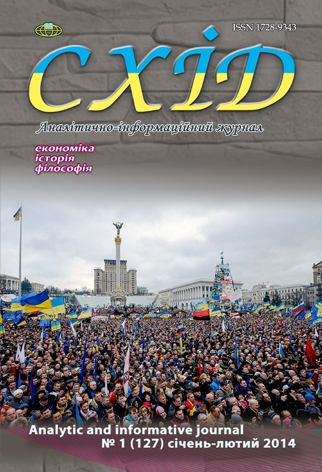Ideological component of martin Heidegger's philosophy in Herbert Marcuse's critique
DOI:
https://doi.org/10.21847/1728-9343.2014.1(127).21082Keywords:
reflex, transcription, referent, methodology, ideology, neutralizationAbstract
Nowadays the Ukrainian historical and philosophical science is going through a harsh crisis of methodology, caused by distortion of universal coordinates of scientific thinking allegedly providing the condition of the so-called methodological pluralism. Numerous discussions focus on the question about the very scientific nature of history of philosophy as a branch of knowledge. The tendency which appears to prevail in such disputes defines history of philosophy as philosophy in contrast to the opinion that history of philosophy should be rather seen as approximate to social history. This paper aims at revealing relevant methodological instruments of historical reconstruction of philosophical forms in the concreteness of their existence, conditioned by lives of real people with their real ends and drives. Thus we address Herbert Marcuse's critique of Martin Heidegger's philosophy, since once being a Heidegger's assistant he adopted a highly critical position towards his master's philosophy.
Heidegger's Being and Time attracted Marcuse by existential analytics of Being-in-the-world of Dasein and the perspective on historicity of humane condition. In Marcuse's eye Heidegger had come close to the breakthrough towards maintaining of concrete philosophy, providing possibilities of philosophical approach to social realities. By 1932 Marcuse's attempts to reconcile categories of Heideggerian paradigm with strategies of Marxism proved to be a failure. After 1932 Marcuse finds the resources of theoretical enrichment in Marx's Economical and Political Manuscripts of 1844 and distances himself from Heidegger. Nevertheless Heideggerian moments appear to be employed further on in his thinking. Marcuse's critique provides us with an efficient assessment of Heidegger's key concepts as neutralized terms, unable of reaching out to the very reality of human existence, being ideological doubles of sociologicaly valid terminology.
Downloads
References
Farias V. Foreword to the Spanish edition / Victor Farias // The Heidegger case: On philosophy and politics. - Philadelphia : Temple university press, 1992. - Pp. 333-347.
Marcuse H. An Exchange of Letters / Herbert Marcuse, Martin Heidegger ; [tr. by Richard Wolin] // The Heidegger's Controversy : A Critical Reader. - Cambridge : WIT Press, 1998. - 325 p.
Olafson F. Heidegger's Politics: An Interview with Herbert Marcuse / Frederick Olafson, Herbert Marcuse // The Essential Marcuse. - Boston : Beacon Press, 2007. - Pp. 115-127.
Ott H. Biographical bases for Heidegger's "Mentality of Disunity" / H. Ott // The Heidegger case: On philosophy and politics. - Philadelphia : Temple university press, 1992. - Pp. 93-113.
Wolin R. The politics of being: The political thought of Martin Heidegger / Richard Wolin. - New York : Columbia university press, 1990. - 221 p.
Wolin R. What is Heideggerian Marxism? / Richard Wolin // The Frankfurt School Revisited / Richard Wolin. - New York : Routledge, 2006. - Pр. 61-80.
REFERENCES
Farias V. (1992), Foreword to the Spanish edition, In: The Heidegger case: On philosophy and politics, Temple University Press, Philadelphia, pp. 333-347 (engl).
Marcuse H. and M. Heidegger (1998), An Exchange of Letters, In: The Heidegger’s Controversy: A Critical Reader, WIT Press, Cambridge, pp. 152-167 (engl).
Olafson F. (2007), Heidegger’s Politics : An Interview with Herbert Marcuse, In: The Essential Marcuse, Beacon Press, Boston, pp. 115-127 (engl).
Ott H. (1992), Biographical bases for Heidegger’s “Mentality of Disunity”, In: The Heidegger case: On philosophy and politics, Temple University Press, Philadelphia, pp. 93-113 (engl).
Wolin R. (1990), The Politics of Being: The political thought of Martin Heidegger, Columbia University Press, New York, 221 p. (engl).
Wolin R. (2006), What is Heideggerian Marxism?, In: Wolin R. The Frankfurt School Revisited, Routledge, New York, pp. 61-80 (engl).
Downloads
Published
How to Cite
Issue
Section
License
Copyright (c) 2014 Andriy Karpenko, Viktoriia Zabudko

This work is licensed under a Creative Commons Attribution-NonCommercial-NoDerivatives 4.0 International License.
1. Authors bear responsibility for the accuracy of facts, quotations, numbers and names used.
2. Manuscripts are not sent back.
3. The publisher does not always agree with the authors' opinion.
4. The authors reserve the right to authorship of the work and pass the first publication right of this work to the journal under the terms of a Creative Commons Attribution-NonCommercial-NoDerivatives 4.0 International License. This license allows others to distribute (copy) the published work for non-commercial purposes, provided there is mandatory attribution to its authors and a link to the first publication in our journal.
5. The authors have the right to conclude separate supplement agreements that relate to non-exclusive work distribution in the form in which it has been published by the journal (for example, to upload the work to the online storage of the journal or publish it as part of a monograph), provided that the reference to the first publication of the work in this journal is included.

